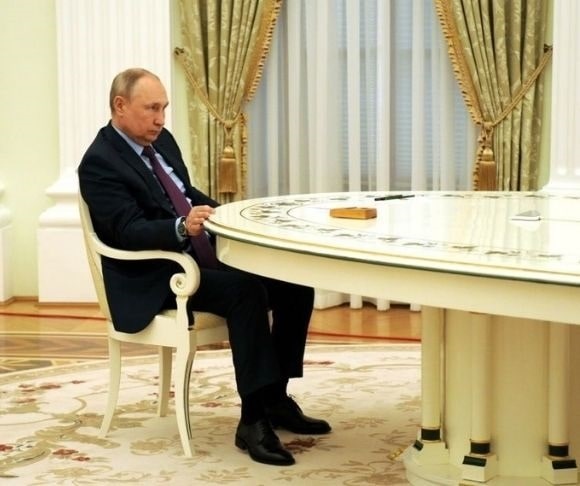The U.S. has never been particularly strong in executing information warfare. But where the government falls short, the press seems to be picking up the slack. Information warfare, understood broadly, is the use of words and images influencing a target audience to shape behaviors, attitudes, or opinions. Strangely, whether by fluke or just in covering the Ukraine crisis, the news and social media have established first-hand interview statements, photographs, and videos as effective weapons. 
Liberty Nation had the opportunity for an exclusive interview with Mr. Christopher Donnelly, subject matter expert on information warfare and specialist advisor to the British House of Commons Defence Committee. LN asked, “Do you believe the photos of Russian casualties and prisoners and the evident misery inflicted on the Ukrainians will persuade the Russian people to exert more public pressure on President Putin to stop the fighting?” Mr. Donnelly explained:
“Like all tyrants, the thing Putin fears most is revolt by his own people. The immense efforts taken by both the Russian Army and the state security organizations to prevent the Russian people learning about what is happening in Ukraine is evidence of how vulnerable the regime thinks it is to their population being exposed to the truth. If Russian casualties were to increase dramatically, and images of Russian soldiers brutalizing the very people Putin claims are no different from Russians themselves were to spread in from Ukraine, then the social pressure in Russia could reach bursting point.”
The visible countenance of fear on young Ukrainian faces gives viewers a better perspective of the carnage being visited on them from Vladimir Putin’s urban killing machines and aerial bombardments. Olena Gnes, a Ukraine travel agent, has become the voice of the Ukraine people from a Kyiv bomb shelter. “My husband, their father — right now — he’s with the other guys and ladies. He is fighting with the Russians; he [her son] thinks that daddy will not come back, and I told him, no he will,” Olena told Fox News’ Neil Cavuto. The young mother implored:
“What surprises me is that the world leaders still do not understand what is happening. They’re more like children because what is happening is terrible. The aggressor, Russia, attacked Ukraine. Simply because they want us to be their territory … I beg you, please, don’t let this happen. You see what is happening. They are just killing us.”
This level of personal tragedy is precisely what makes convincing images and messages. They also have the benefit of being true. They accurately depict the conditions through which people are trying to survive.
Equally compelling but more meaningful to the mothers of Moscow are the photographs of the Russian dead left behind and littering the battlefield. Russian families are just as fearful of having their sons’ lives destroyed forever to appease some incomprehensible desire on Putin’s part to expand the Kremlin’s influence. Additionally, reports of disorganization and failure of the Russian logistics system to provide enough food and supplies coming from Moscow’s side of the battlefield are messages back to the Russian people sowing doubt about Putin’s gambit.
 What should be disturbing to the average citizen in Russia is the approximately 400 of Moscow’s soldiers being killed daily in Ukraine. “The bodies of Russian soldiers have been left in areas surrounding Kharkiv. Videos and photos on social media show charred remains of tanks and armored vehicles, their crews dead or wounded,” according to The New York Times. Additionally, a publicly available YouTube video shows a decimated Russian convoy in Bucha, a suburb of the capital city Kyiv. The fierceness of the fighting is evident in the smoking hulks of combat vehicles.
What should be disturbing to the average citizen in Russia is the approximately 400 of Moscow’s soldiers being killed daily in Ukraine. “The bodies of Russian soldiers have been left in areas surrounding Kharkiv. Videos and photos on social media show charred remains of tanks and armored vehicles, their crews dead or wounded,” according to The New York Times. Additionally, a publicly available YouTube video shows a decimated Russian convoy in Bucha, a suburb of the capital city Kyiv. The fierceness of the fighting is evident in the smoking hulks of combat vehicles.
More starkly powerful still for Moscow’s citizens are video images of captured Russian infantry and armored vehicle drivers stating they had no idea why they were there, and they had run out of food and fuel. “They don’t pick up corpses. Even the funeral did not come … We were deceived and used like a meat shield … I wasn’t even aware of going to kill someone … They wanted us to go to war like a cannon-fodder,” were typical of the statements by several captured Russian soldiers, shown on Sky News Australia’s The Bolt Report.
Whether intentionally designed to persuade or not, the images, interviews, and videos send compelling messages of brave Ukrainian people standing up to Putin’s war machine and prevailing. There is an equally devastating commentary on Vladimir Putin sending his soldiers to their deaths without proper support and not knowing why they were put in harm’s way.
The views expressed are those of the author and not of any other affiliation.
~ Read more from Dave Patterson.




